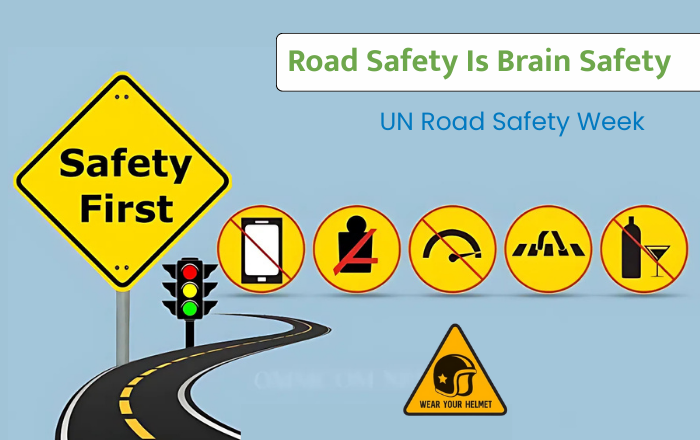Every year, India loses over 150,000 lives to road traffic accidents—more than any other country in the world. Millions more suffer serious, often life-changing injuries. As a neurosurgeon in India, I have witnessed the heartbreaking consequences of road crashes, especially those resulting in traumatic brain and spinal cord injuries. UN Road Safety Awareness Week is a crucial time to reflect on these preventable tragedies and take action.
◉ The Neurosurgical Burden of Road Accidents in India
In my practice, many patients who come to the emergency room with head injuries are young men—often the sole breadwinners of their families—injured in two-wheeler accidents without helmets. Children are brought in after being thrown from vehicles without seatbelts or proper child restraints. Pedestrians struck by overspeeding or distracted drivers arrive unconscious, and some never wake up.
These are not isolated incidents. Head injuries are among the leading causes of death and disability in road accidents in India. For every life lost, many more suffer permanent neurological damage—leaving families shattered emotionally, socially, and financially.
◉ Prevention Is the Best Treatment
As a neurosurgeon, I can repair damaged brains—but only to a limit. Many injuries are irreversible. What we truly need is prevention. Here’s how:
- Wear a helmet every time you ride a two-wheeler, even for short distances. A BIS certified helmet can reduce the risk of head injury significantly.
- Always wear a seatbelt — even in the back seat.
- Use child safety seats for infants and toddlers; carrying a child on your lap is not safe.
- Avoid using mobile phones while driving or crossing roads.
- Never drive under the influence of alcohol or drugs.
- Follow speed limits and be extra cautious near schools and residential areas.
◉ The Need for Stronger Laws and Enforcement
While public awareness is growing, enforcement remains inconsistent. Many people still treat traffic rules as optional. We need stricter implementation of existing laws under the Motor Vehicles (Amendment) Act and better infrastructure—safer pedestrian crossings, well-lit roads, and prompt emergency medical response.
Governments and civic authorities must work hand-in-hand with health professionals, educators, and community leaders to make road safety a national priority.
◉ A Collective Responsibility
Road safety is not just a government duty—it is a shared social responsibility. Every time we put on a helmet, buckle a seatbelt, or refuse to use a phone while driving, we are not just protecting ourselves—we are setting an example and possibly saving a life.
As someone who has seen the devastating effects of road trauma up close, I urge everyone in India: Respect the road, protect your brain, and value life.
This UN Road Safety Week, let us commit to making India’s roads safer—for ourselves, our children, and generations to come.
◉ Consult an Expert Neurosurgeon for Your Child’s Safety
For expert care and guidance on brain and spinal injuries, consult Dr. Harshal Agrawal, Pediatric Neurosurgeon in Thane. Early intervention can make a life-changing difference. Prioritize safety today to protect your loved ones tomorrow.
The 8th UN Global Road Safety Week is being held between 12-18 May 2025.

